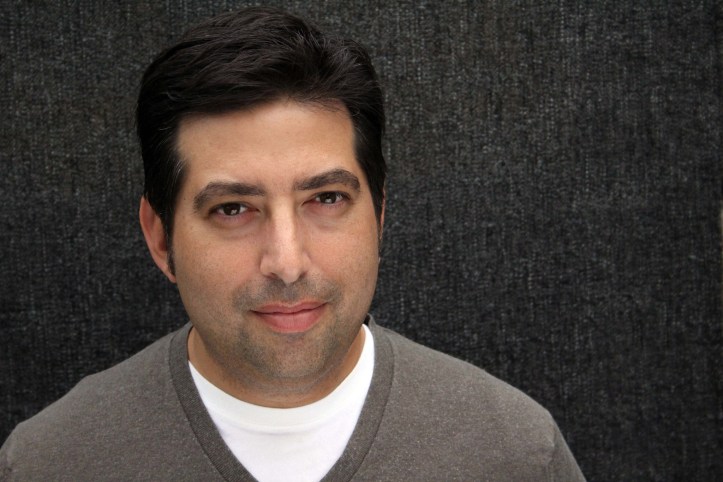
Picture a rabbi with a machine gun, and you’ve got a solid visual that accurately represents Tod Goldberg’s terrific new novel, Gangster Nation. In the second book in his series, Sal Cupertine, a Chicago-based mafia hitman, returns for another gritty adventure. This time, though, Sal is hiding in Las Vegas pretending to be a rabbi named David Cohen, while the FBI continues their relentless search for him after the events of Gangsterland (2014).
Ahead of Gangster Nation‘s highly-anticipated new release, author Tod Goldberg was kind enough to take part in our Five Questions segment, offering up some fantastic responses that’ll no doubt leave readers chomping at the bit to get their hands on his new book.
TRBS: There are so many moving parts to this book, yet they all come together to form an electrifying, suspenseful reading experience. What is your writing process like–do you outline ahead of time or just write as you go?
Goldberg: “I always have a general idea of where I’m going with a book, but I don’t always know how I’m going to get there. In the case of Gangster Nation–which is both a sequel and a book I hope can be read alone–I knew that I wanted the main character–mafia hitman Sal Cupertine, who is hiding in Las Vegas as Rabbi David Cohen–to fall deeper and deeper into the mundane life of a rabbi, so that he starts to feel comfortable, so that he starts to become good at his fake job, while behind him, in other parts of the world I’ve created, it’s all starting to crumble around him. What I didn’t quite know, however, is how exactly to do that. My editor took me to lunch a few months before I started to write the book and I explained to him what I wanted to do and over several hours of chips and spinach dip, we beat out a general path…and then 18 months later, when I turned the book in, it had the same bones, but entirely different skin.
“I keep lots of little notebooks and I’m constantly scrawling ideas on Post-It Notes or screaming at my wife from the shower, “The mob in Chicago doesn’t even know!” And she’ll come into the bathroom and say, “What?” And I’ll say, soap in my hair, “Write this sentence down, I’ll know what it means when I get out of the shower!” Invariably, this process does not end up being the best way to plot out a book…but it does leave me open to a bit of wild invention as I go.
“When I wrote Gangsterland, I’d spent about five years thinking about it before I ever put finger to keyboard, so I knew pretty much exactly what was going to happen and when. And, really, it’s a little different for every book I write. When Brad Meltzer and I did The House of Secrets together, for instance, we beat it all out on giant white boards, and as the book took shape over a year of writing, it morphed and changed as we came up with new and better ideas and learned how each other wrote. Brad really taught me a lot about plot–he’s a master of it–and that process changed the way I look at things now. But the fact is, after over a dozen books, I don’t really know what the best way to write one is. It’s never easier, I can tell you that much. “
TRBS: Parts of this book read similar to Don Winslow’s gritty, up-close-and-personal style of dialogue. Other chapters read like a traditional mystery/thriller. On top of that, you’ve packed so much history and lots of facts into this book. Everything works so well together, but it couldn’t have been an easy process to pull that off. How much research did you have to do before sitting down and actually starting the writing process?
Goldberg: “I had to do a ton of research. I’m not a rabbi and neither, really, is my main character and so as I’ve written him over two books, I’ve tried to replicate in my reading where he would be in his. This is a time-consuming process and not an entirely entertaining process, but in many ways I’m only capable of writing Rabbi David Cohen by understanding what he does and doesn’t know and then how he’d distill information through a mind trained for killing. I’ve learned a lot about organized crime over the years, because it’s a specific interest of mine–which is to say, I have always been mystified by the glamorization of organized crime, how movies and TV and books have turned these bad guys into heroes, and how the reality of these men is fundamentally different from their portrayal in our entertainment.
“With this book, I wanted to take a deeper look into how this has affected other organized criminal organizations–namely gangs–who don’t enjoy this same glamour, but also how all crooks end up parroting each other. So that took some investigation. I also fortuitously attended the Writers Police Academy in Green Bay while I was in the midst of writing this book and was able to pick the brains of some law enforcement folks working in the very world I was writing about, which was great. There’s nothing better than just talking to someone immersed in the real world.
“I’m a big fan of Joseph Wambaugh’s–I grew up on his books–and over the years I have had the unique opportunity to spend some time talking to him about books and writing. When Hollywood Station came out in 2006, it was his first novel in something like a decade and I interviewed him for a magazine and I remember asking him how he so seamlessly got that cop dialog back, that style he’d made famous, really, and he sort of laughed and said that when he’s going to write a novel, he’ll take a bunch of cops out to dinner and just listen to them talk. I don’t even know if that bit made it into the story I was writing, because the fact was, I just wanted the secret! And so I try to do that as part of my research: I try to listen to how people talk, how they process information, how they tell a joke, what they find funny, what moves them. And so I think in a book that has four different points of view, it’s important to write each point of view differently so that every section conveys the world in a specific and peculiar way.
“You mentioned Don Winslow and I should say: He’s the very best in the business right now and I really admire how each successive work he’s published has become more complex and challenging–when I read The Cartel, I thought: The rest of us should just quit.”
TRBS: Sal is a truly fascinating character who is quite unlike anyone else in the genre today. A Chicago hitman who takes on the identity of a rabbi named David Cohen…where did you get the idea for this character, and how much fun is it to write about him?
Goldberg: “The first time I wrote about this character was almost ten years ago at this point. I was asked to write a short story for Las Vegas Noir–one of those great Akashic anthologies of city-based noir stories–and specifically about Summerlin, the master-planned neighborhood I’d lived in back in the late 90s when I made Las Vegas my home. The problem was, not a lot happens in Summerlin. It’s one of those leafy suburbs of gated communities and golf courses, interrupted periodically by a Starbucks. So a few weeks before my deadline, I started to get panicked and I happened to be stopped at a light in Palm Springs, where I live now, and I saw someone walk out of an old cemetery in town, the kind where no one gets buried anymore. I had a thought then that if you really wanted to get away with murder, you’d just bury a body in a casket, in an old cemetery. And then I thought…well, who would own that cemetery? And in the space of a light cycle, the idea of a Jewish cemetery in Summerlin began to take shape in my mind. A cemetery run by the mafia. Connected to a synagogue. And that they were effectively laundering bodies through it. And by the time I got home, the idea was all there. I wrote a short story called “Mitzvah” that was about Sal Cupertine’s last day as Rabbi David Cohen, after spending fifteen years on the job. I tinkered with it some more and then included it in my collection of stories Other Resort Cities. And then I sat on it for four years while I wrote the Burn Notice novels, before finally writing Gangsterland, which came out in 2014. In that time, the idea I had originally in “Mitzvah” changed quite a bit, save for the core idea that an Italian mobster ends up hiding out in Las Vegas as a fake rabbi and running a body laundering business through a temple cemetery.
“I loved writing Gangsterland. And when I was done with it, I had the sense that I could probably write about this character for a very long time. Gangster Nation opened up entirely new threads, brought in all-new villains (if such a thing is true in a book where the main character is a traditional villain), and established in my mind a clear course toward a third novel. I love writing this character, love working in this world I’ve created, and really enjoy the strange places this story lets me visit.”
TRBS: Who are some of the authors you enjoy, and what books are currently on your nightstand?
Goldberg: “My nightstand right now looks like I’ve lost my mind. I’m reading about ten books at once. Bruce Springsteen’s memoir Born to Run. Ivy Pochoda’s Wonder Valley, which comes out this November. Matthew Zapruder’s Why Poetry. Jared Sexton Yates’ The People Will Rise Like The Waters Upon Your Shore. Bluebird, Bluebird by Attica Locke. And then I’ve always got an old Elmore Leonard novel somewhere under everything else. I think I spy Cat Chaser…
“In addition to everyone I’ve already mentioned, I’m a big Daniel Woodrell fan. I think Vu Tran is one of the best new crime writers alive, same with Bill Beverly. And then there’s perennials like Donald Westlake and Lawrence Block, writers who taught me how to make a bad guy a hero, and writers like Alice Munro, who teaches me about the human condition with every line she writes. And then a million others.”
TRBS: Lastly, now that Gangster Nation is hitting bookstores, what’s next for you?
Goldberg: “We recently sold the book to the folks who make Peaky Blinders, so I’m hoping part of what’s next for me is some good news about a TV show! And then I’ll be on the road for much of the fall. And then I’m hoping to get back to writing another thriller. With a character or two you may have read before…”
Gangster Nation hits bookstores everywhere on Tuesday, September 12th. Order your copy today!
